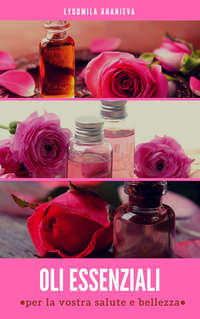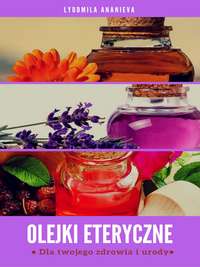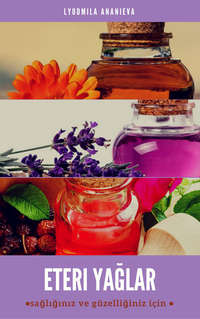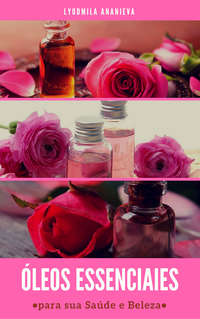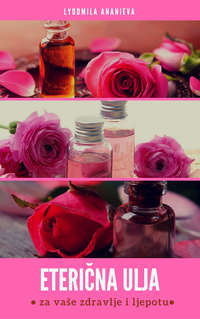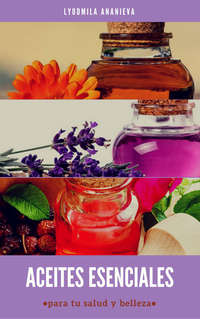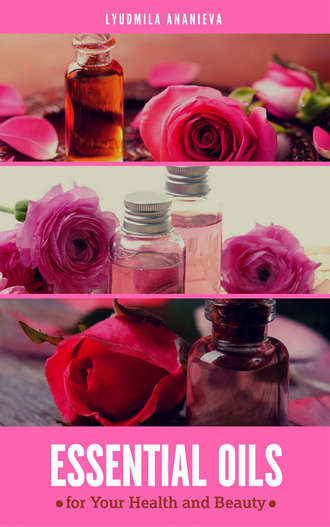
Полная версия
Essential Oils For Your Health And Beauty

ESSENTIAL OILS⢠for Your Health and Beauty â¢Part 2authorLyudmila Ananieva
CopyrightEssential Oils: for Your Health and BeautyPart 2Copyright © 2017 by Lyudmila AnanievaOctober 2017Publisher: Tektime â www.traduzionelibri.itAll rights reserved. This e-book is licensed for your personal enjoyment only. This e-book may not be sold or given away to other people. If you would like to share this e-book with another person, please purchase an additional copy for each person you share it with. If you are reading this e-book and did not purchase it, please purchase your own legal copy. Thank you for respecting the hard work of this author.
Table of Contents
Cover
Title page
Copyright
Overview
Rose
Anise
Juniper
Neroli
Petitgrain
Pachouli
Blue tansy
German chamomile
Balm
Nutmeg
Verbena
Oregano
Marigold
Caraway
Key lime
Laurel
Thyme
Cypress
Dill
Fennel
Coffee
Cajuput
Myrrh
Essential Oils Against Acne and for Problematic Skin
Contraindications for Using Essential Oils
Caution When Using Essential Oils
Thank You
Overview
Among the unique properties of essential oils, the ability to regulate the level of hormones in the body that are responsible for preserving and maintaining youthfulness should be highlighted. Among them we can note the oil of myrrh, sandalwood, jasmine, ylang-ylang, rose, neroli, patchouli, etc. The high efficiency of their use is due to the phytohormones contained in the oils, which have a structure similar to human hormones.
Some types of essential oils have a powerful antioxidant effect (juniper, rosewood, vetiver, myrrh, rose, etc.), they contribute to restoring the oxygen balance in our body, while eliminating the toxic effect of oxygen when it is abundant, thereby slowing down the natural aging of cells, enhancing tissue respiration and blood supply.
The uniqueness of essential oils is that when applied in each specific case, their curative and beneficial effect is exactly directed to the area most in need. That is why it is so important to choose the right essential oil in this or that case. If this condition is met, the positive effect will be quite rapid.
It is important to note that essential oil use for the skin, as a rule, is prohibited in undiluted or pure form (with the exception of some types that are applied directly to problem areas), since they cause a strong irritation of the skin surface. Therefore, they must be diluted in vegetable (base or carrier) oils before use. Basically they are used to enrich self-prepared creams and masks for face and body skin, as well as hair.
For skin care, essential oils have a wide spectrum of action. They are used for any type of skin in order to cleanse, rejuvenate, increase firmness and elasticity of the skin, to treat irritations, inflammations, redness, acne, post-acne, etc. In the first part of the book you can find the skin type determination table.
In this book you will find:
1 Useful properties of essential oils.
2 Positive effect on skin, hair, and nails.
3 Recipes for beauty and health.
1. Rose
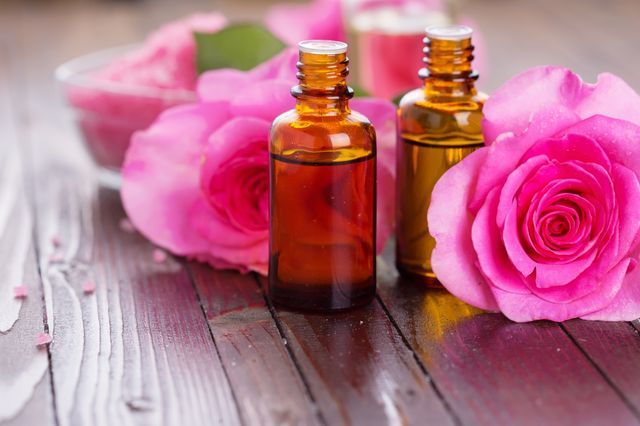
1.1. Useful properties
eliminates inflammatory processes on the skin, combats skin irritation and peeling;
promotes cell rejuvenation;
smooths the skin, increases firmness and elasticity;
regulates the secretion of sebaceous glands;
eliminates scars
combats stretch marks (striae);
perfectly combats migraines and headaches, eliminates spasms of cerebral vessels;
normalizes the endocrine system, regulates the womanâs hormonal balance;
has a positive impact on the digestive tract function;
has a healing and protective effect on the mucous membranes;
is an excellent remedy against thrush (candidiasis);
has a disinfecting effect, stimulates the regeneration of tissues;
has a calming effect during overexcitation, relieves of neuroses, depressions, and insomnia;
improves memory, tones up, improves attention span;
has a positive impact on the functioning of cardiovascular system;
treats eye diseases, improves vision in general;
has a beneficial effect on days of premenstrual syndrome (PMS), normalizes the amount of menstrual flow.
1.2. Rose oil in cosmetology and perfumery
Rose is rightfully considered the tsarina of fragrances and the queen of flowers. Its aroma has always been associated with luxury and femininity. Today, rose essential oil is used in the production of perfumes, cosmetics, as well as specifically in the care of face skin and hair.
Thanks to the high rejuvenating properties, rose oil is effectively used in the care of mature, fading skin, as well as skin that has partially lost its firmness and elasticity. Regular use of rose essential oil for care stimulates the regeneration processes in the cells, makes the facial oval and the contour of eyelids clear, tones up, increases firmness and elasticity of the epidermis, makes the face smoother by relieving of shallow facial wrinkles. In addition, it can eliminate senile pigment spots, improve the overall complexion, and smooth the skin.
The use of rose oil beneficially affects dry skin with signs of coarsening and peeling, it intensively nourishes and softens the skin surface, eliminating, as quickly as possible, the existing problems. When used for skin care, it creates an invisible film that serves to protect the skin from the negative effect of external factors (wind, frost, sun).
Rose oil shows useful properties for the care of hypersensitive face skin. Its application soothes the skin, relieves inflammation and irritation, preventing them from reappearing. For those who have problems with rosacea (spider veins) on their faces, rose oil will help make them less noticeable with regular use.
For eyelid skin care, rose oil will also bring undoubted benefits. Adding it to care products for the skin around the eyes, you quickly get rid of dark circles under the eyes, swelling, and mimic wrinkles.
This truly âroyal oilâ will help in general to improve the face skin in such diseases as psoriasis, allergic dermatitis, eczema, herpes, neurodermatitis, etc.
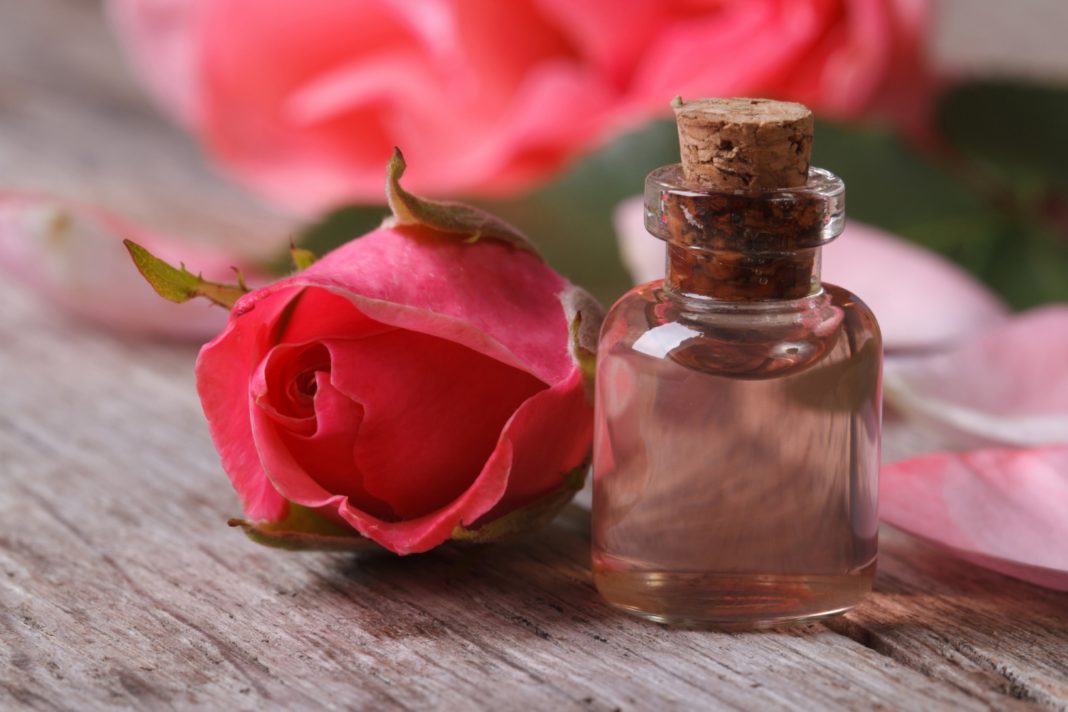
1.2.1. Anti-aging night cream
1.2.1.1. Composition
Sweet almond oil â 30 ml.
Rose oil â 3 drops.
Patchouli oil â 3 drops.
Ylang-ylang oil â 2 drops.
Neroli oil â 2 drops.
1.2.1.2. Use
In almond oil add the remaining ingredients and stir well. Apply this âcreamâ at night to a pre-cleaned face skin of dirt and makeup. After twenty minutes, blot the product excess with a paper towel. Keep refrigerated.
1.3. Recipes for treatment with rose oil
For thrush it is recommended to perform a douching with rose oil, for this, add to warm boiled water (5 l) a mixture of a teaspoon of soda and 3 drops of rose oil. The procedure should be done daily for seven days.
For herpes on the labia, rose oil is helpful when used in undiluted form. It should be applied directly to blister formations three to four times a day.
To get rid of psoriasis, allergic dermatitis, neurodermatitis, eczema and other skin diseases, it is well to add rose oil to the ointments prescribed for the treatment of these diseases. One drop of oil should be taken for a single dose of ointment.
To relieve toothache, it is well to rinse the oral cavity with the following composition: in 100 ml of water, add a mixture of half a teaspoon of baking soda and one drop of rose essential oil.
In order to improve overall health, it is recommended to take one drop of rose oil three times a day before eating. It is dripped into a piece of sugar and eaten.
1.3.1. Rosewater
1.3.1.1. Effect
It combats crowâs feet, removes oily shine, and narrows pores.
1.3.1.2. Composition
Warm boiled water â 250 ml.
Rose oil â 10 drops.
1.3.1.3. Use
Add oil to water and apply daily, morning and evening, as a cleansing lotion. The product can be used to eliminate swelling and bags under the eyes. To do this, apply cotton pads soaked in rosewater to closed eyes and leave for ten minutes. After a few procedures, the problem completely disappears.
1.4. Contraindications to the use of rose essential oil
1 Individual intolerance.
2 Cannot be applied in pure form, except in the cases mentioned.
3 Allergic reactions.
4 Pregnancy.
2. Anise
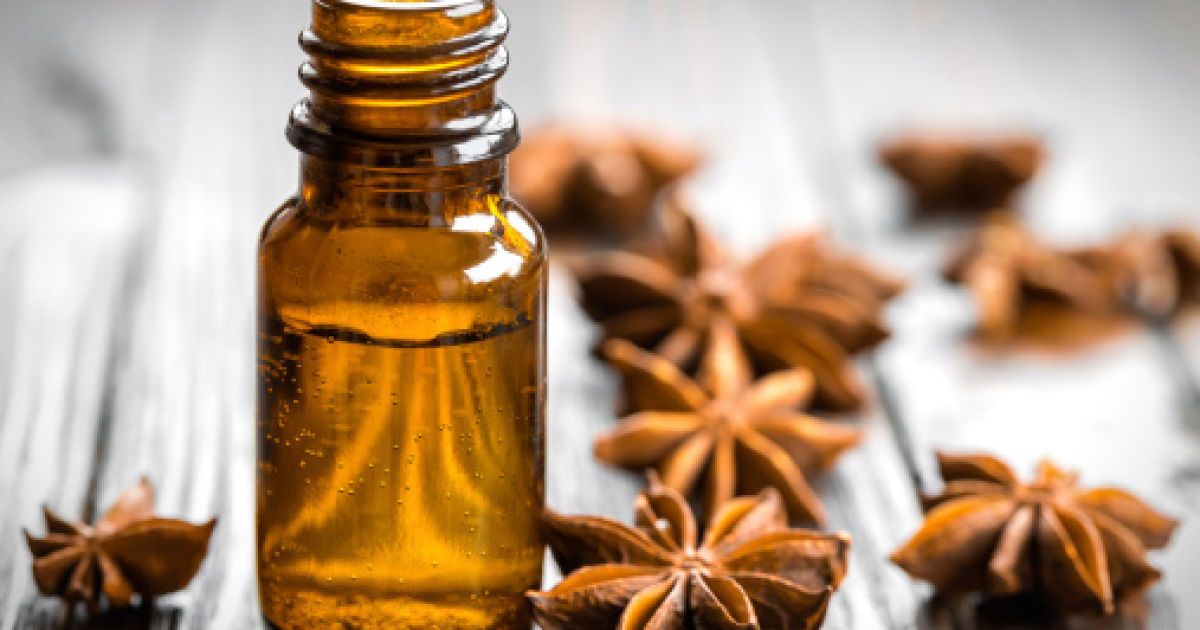
Effect: expectorant, anti-inflammatory, bactericidal, spasmolytic, immunomodulatory, diuretic, antipyretic.
It is used for acute and chronic respiratory diseases (bronchitis, tracheitis, pneumonia, asthma), kidney and bladder diseases, intestinal atony, normalization of water-fat balance and skin rejuvenation.
2.1. Effect of anise essential oil
Anti-inflammatory, bactericidal, spasmolytic, immunomodulatory (mainly increases the B-system activity), diuretic, antipyretic, coronarolytic, anticarcinogenic, antioxidant, expectorant.
Stimulates the respiratory center.
Increases the secretion of digestive glands.
Normalizes the blood supply to the brain.
Eliminates tachycardia.
Improves mental and physical performance.
Relieves nervous and emotional tension.
Optimizes adaptive responses.
Forms complexes with lead ions, contributing to their removal from the body.
Eliminates intestinal atony.
Reduces menstrual pain.
Increases milk production in nursing mothers.
Has a sedative effect, helps to eliminate depression and to reduce child hyperexcitability and tearfulness, helps in case of nervous exhaustion.
Helps to normalize the water-fat balance of the skin and to increase the turgor of its cells, which increases skin firmness.
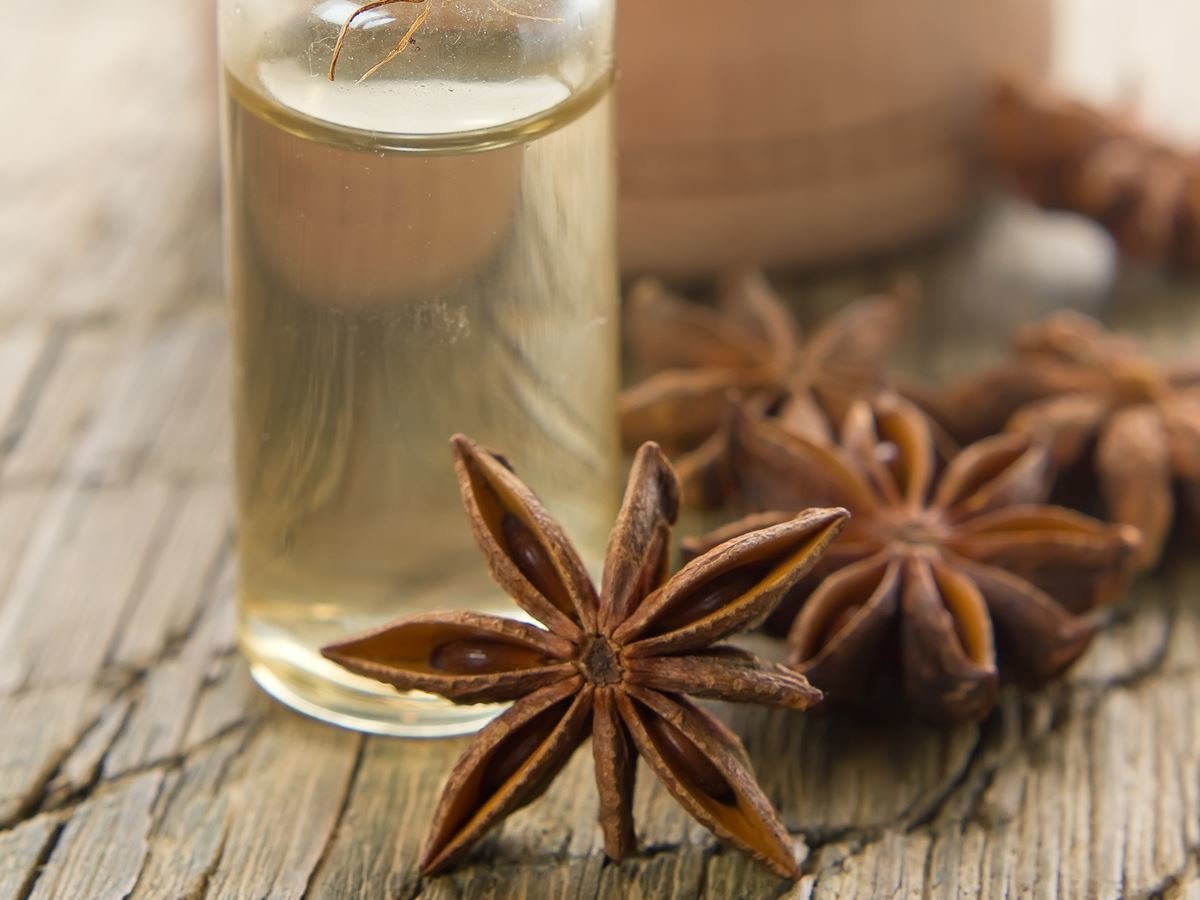
2.2. Use of anise oil in cosmetology
Such a plant product is primarily used to care for mature and fading skin. The oil stimulates the epidermal cells to produce more collagen, tones the skin, and increases its firmness. It is also effective for some skin diseases, helps to get rid of the first signs of scabies, as well as lice and fleas. In cosmetology, anise oil has found application in the care of locks. This plant product is used to enrich shampoos, masks and conditioners. It is also added to aromatic baths and special relaxing and restorative massages. While enriching cosmetic products, it is necessary to strictly respect the amount of oil: we take 3 drops of essence per 10 ml of base oil. To obtain a massage mixture, the same proportion is used, only as a base, we use a cream or a body lotion. While taking an aromatic bath, just 7 drops of this plant product should be added to the water.
2.3. Precautionary measures
Strong oil, which is a powerful stimulant.
When using high doses for massage and bath, this may cause irritation of gastric mucous membranes and dizziness, and prolonged use of high doses can lead to general poisoning, muscle paresis, and circulatory as well as brain disorders.
Regular use of oil internally may cause irritation of the gastric mucosa. With extreme caution, it is recommended to use it for any pathology of the gastrointestinal tract and only under the supervision of a doctor.
It should not be used during pregnancy and its use must be limited when blood clotting is high.
3. Juniper
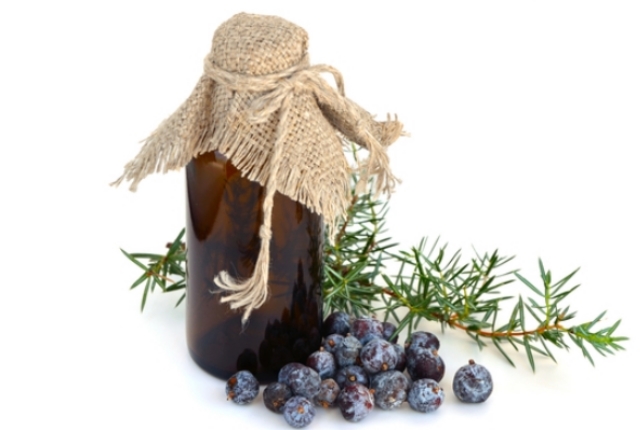
Effect: general stimulant, diuretic, antiseptic, expectorant, anti-inflammatory, detoxifying, local irritant, wound-healing. Can excrete uric acid and toxins. Improves digestion. Promotes weight loss. Increases the elasticity of blood vessels and cartilage tissue. Perfectly tones up the nervous system, relieves irritability, eliminates stressful reactions and destructive emotions.
Juniper essential oil is used (see further for details) to improve metabolism, increase body resistance and prevent exposure to harmful chemical factors and small radiation, and in the case of arthritis, osteochondrosis, sprains, swelling, gout, bronchitis, acute respiratory infections (ARI), flu, urolithiasis, hemorrhoids, dermatitis, eczema, psoriasis, and long unhealed wounds and ulcers.
Juniper oil is used as an effective cosmetic for the care of oily and normal skin, and also as a means of personal hygiene, which normalizes acid-base reaction and bacterial balance of sexual organs.
Essential oil-enriched creams, tonics, rinses, masks, compresses are recommended for oily and inflamed skin, open pores, acne, long unhealed ulcers and wounds, infiltrates, varicose veins, eczema, psoriasis and different types of dermatitis and dermatosis.
Rinsing the hair after washing with the addition of essential oil removes dandruff. It repels mites and fleas and is used to disinsect homes and pets. Enrichment of cosmetics: 2â3 drops per 10 g of base (cream, shampoo, gel, liquid soap, etc.).
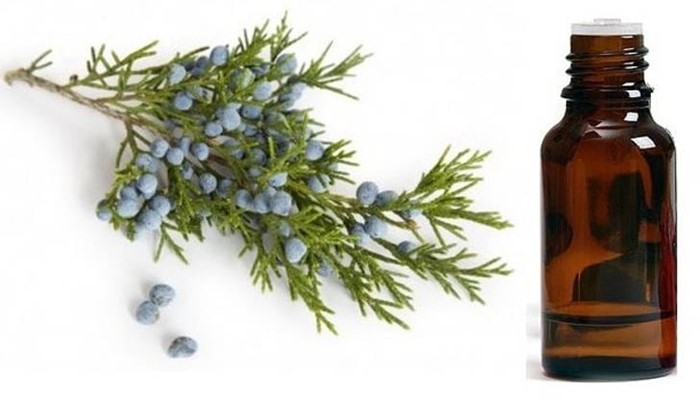
3.1. Additional recipes
3.1.1. Juniper essential oil for hair
Against dandruff, to strengthen and grow hair: effectively apply aromatic massage on the scalp and aromatic rinsing of hair with juniper essential oil. For dry type of hair: once a week, for oily type: twice.
Aromatization and disinfection of air in living and working premises: 5 drops in aromatic lamps for every 15â17 square meters of room. Steam inhalation: 2â3 drops of pure juniper oil are added to hot water (temperature about 80â85 °C), we bend over the container and deeply inhale the healing vapors for 7â10 minutes, covering the head with a towel and closing the eyes.
Massage: 5â7 drops per 30 ml of base oil. Compresses: 5â7 drops per 300 g of oil. A gauze bandage is impregnated with the composition and applied to the affected area of the body, and insulated with cellophane and adhesive bandage. Enrichment of cosmetic products: 2â4 drops per 15 g of base.
3.1.2. Juniper oil against stretch marks
Massage and self-massage at home using base vegetable oils with the addition of juniper essence eliminates striae (stretch marks) formed on different parts of the body after pregnancy, breastfeeding, and fast slimming. It is best to combine juniper with grapefruit: to 15 g of base, 4 drops are added of each essential oil. Massage with juniper oil increases muscle tone, smooths shallow skin wrinkles, promotes resorption of scar tissue and scars, and improves complexion.
3.1.3. Juniper oil for weight loss
According to many women, juniper essential oil is a proven helper in the fight against overweight. Ways of using the essence: baths, anti-cellulite massage, wraps, applying creams and lotions for the body.
3.2. Precautionary measures
Check the fragrance for individual tolerance. Do not use in pregnancy and acute kidney diseases (pyelonephritis, glomerulonephritis). Contraindicated to children under the age of three. Use with caution in hypertensive disease. Undesirable to use more than two or three weeks in a row. Do not exceed the dosage when used.
4. Neroli
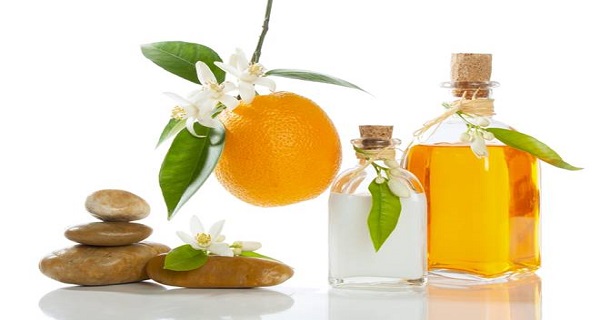
Effect: soothing, antiseptic, analgesic, spasmolytic. Improves blood circulation, normalizes heart rhythm, cleanses blood vessels of sclerotic âplaquesâ, facilitates premenstrual and climacteric syndrome. Has a pronounced regenerating and rejuvenating effect on the skin.
It is used in cardiac arrhythmias, cardioneurosis, angina, coronary heart disease, atherosclerosis, hemorrhages, fatigue, irritability, anxious and depressive conditions, insomnia, for prevention of capillary rupture and stretch marks (striae), and also for caring for irritated, flabby, sensitive and dry skin.
4.1. Use of oil for face skin, body and hair
Neroli oil is universal. It perfectly suits any type of skin. However, with powerful tonic and rejuvenating properties, it is especially effective for mature skin with signs of aging or fatigue. Its use ensures that the skin regains its freshness, and becomes more firm and elastic. It helps to smooth existing facial wrinkles and protects against the appearance of new ones. In addition, the cytophylactic properties, which are also inherent in the oil, affect the growth of new cells â i.e. promote skin regeneration.
Dry and sensitive skin also finds in neroli oil a reliable protector. Applying it will restore the hydrolipidic mantle of the skin, which will protect it from excessive drying and loss of elasticity. It removes irritations and spots caused by stress, and also becomes a solid armor, protecting the facial skin from the aggressive effect of the external environment.
The most common use type of neroli oil is to add it to a variety of cosmetics: homemade face masks and creams, and all kinds of lotions. Typically, 2 drops of oil are added to one portion of cream. It is effective to use vegetable oils instead of masks. Dosage is the same: for 1 tbsp. of vegetable oil we need 2 drops of neroli.
A positive result is also achieved when using neroli oil in case of oily, problematic, and inflammatory skin. Antiseptic and bactericidal properties of the oil help combat pimples, relieve inflammation, and help narrow enlarged pores of the facial skin, which significantly reduces the release of fat. In addition, it perfectly eliminates rosacea (spider veins), restores a healthy complexion, and effectively resists skin diseases: herpetic rash, dermatosis, neurodermatitis and so on.
Due to its ability to regenerate healthy young cells, neroli oil is not only used for skin care. It is also useful for hair to gain thickness and shine, strength and elasticity. Besides, oil disinfectant properties help to cope with problems such as dandruff and scalp scaling.
When caring for facial skin: to increase capillary blood flow and to better absorb products applied to facial skin, it is very useful before rubbing with aromatic mixture or neroli essential oil-enriched cream (as well as other nourishing cosmetics) to make a steam bath for the face.
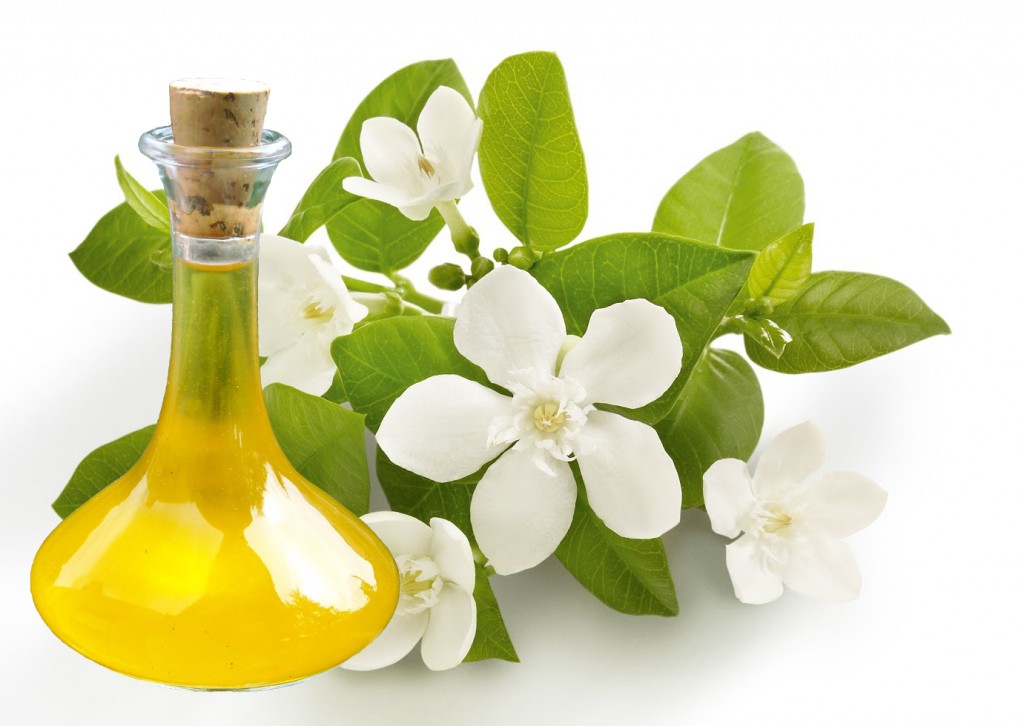
4.1.1. Neroli essential oil for face
It is widely used in professional and home cosmetology. It can be used both as an independent agent and as an auxiliary component in therapeutic mixtures (creams, scrubs, tonics, balms). Neroli oil is suitable for all types of facial skin. It particularly helps well to restore âtiredâ, flabby, dehydrated and sensitive skin by providing such effects: rejuvenation; improvement of complexion; elimination of rashes of different origins; combating herpes rashes; relief smoothing; elimination of wrinkles (prevention of their formation); getting rid of small spider veins; effective and rapid healing of small lesions (wounds, scratches, cracks, abrasions); elimination of pigmented areas; combating dermatological diseases (dermatosis, dermatitis, eczema, ulcers, etc.).
4.1.2. Bath with neroli oil
This oil has a huge penetrating ability. Once in bloodstream, it has a direct effect on all organs. However, it is worthwhile to know that it cannot be used as an independent agent. And it does not matter which way and what kind of bath is supposed to be taken: lying, hot, sitting, warm, or cool. As a base for preparing a bath with neroli oil, it is recommended to use milk, natural honey, table salt (sea salt allowed), and cream.
4.1.3. Neroli essential oil for hair
This oil is one of the most effective natural products that can eliminate the consequences of harmful effects of negative factors on hair health and appearance. We can use it in many ways, namely, to be added: to shampoo; to massage scrub; to balm; to conditioner; in composition of masks with different effects. Regular use of neroli oil for hair care allows to achieve such results: restoration of hair structure along its entire length; supply of hair follicles with nutrients, minerals and vitamins; improvement of blood circulation in tissues of skin covering hairy parts of the head; normalization of the function of sebaceous glands located in the scalp (preventing production of excessive amounts of sebum). As a result, we can get rid of the âdirty ratty hairâ condition.
4.2. Precautionary measures
Neroli essential oil is undesirable to use simultaneously with chemotherapy of tumor diseases.
Safe for pregnancy after a four-month period.
Moderately phototoxic.
Since this oil is an effective relaxing agent, we should not use it when we need a clear mind and concentration.
In large doses, a euphoric effect occurs, similar to the effect of clary sage essential oil.
5. Petitgrain
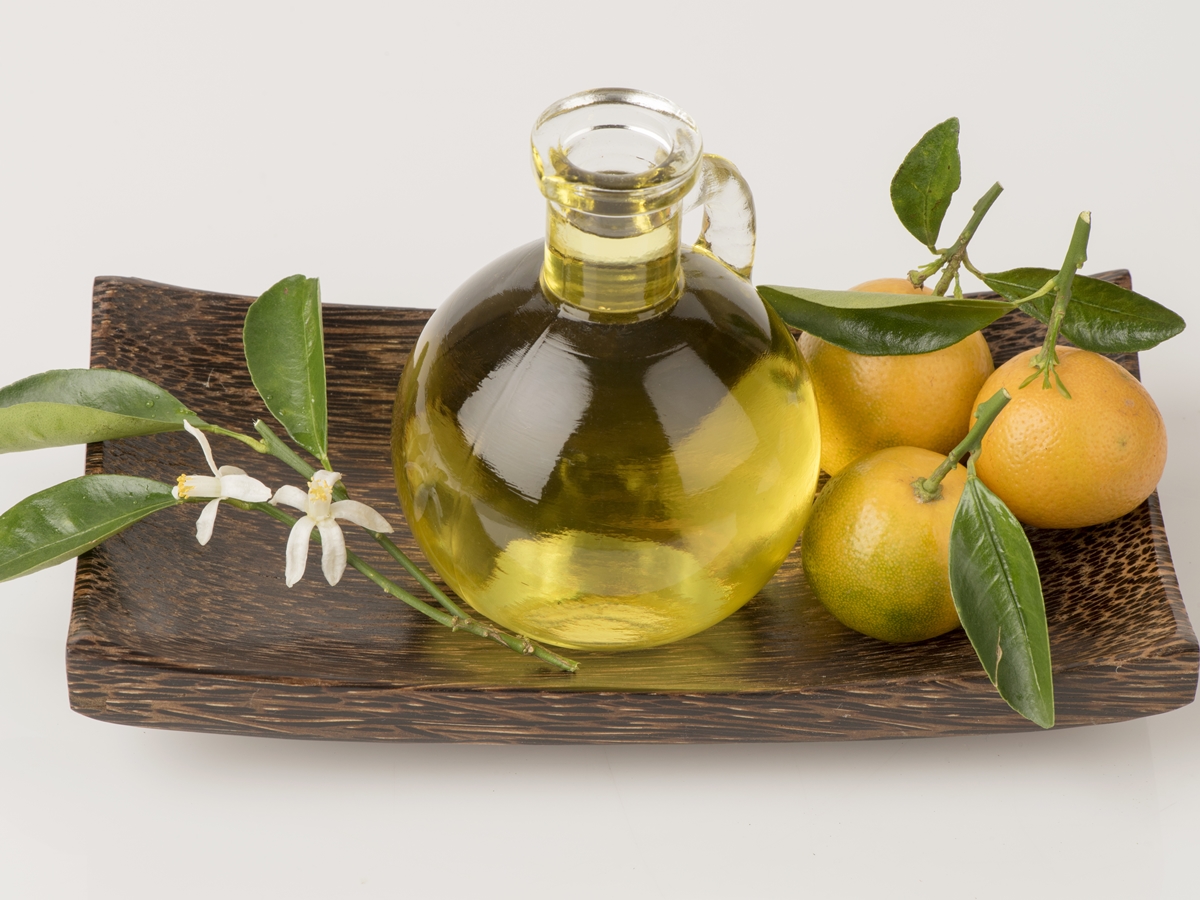
Effect of petitgrain essential oil: is a pronounced antioxidant, has antiseptic and regenerating effect, promotes excretion of toxins from the body, improves blood circulation, has a powerful antisclerotic effect; aromatic adaptogen;


